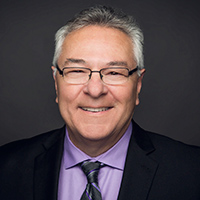Are You Really Ready for a DIY Retirement Plan?
See if you have what it takes by answering a few questions.


Profit and prosper with the best of Kiplinger's advice on investing, taxes, retirement, personal finance and much more. Delivered daily. Enter your email in the box and click Sign Me Up.
You are now subscribed
Your newsletter sign-up was successful
Want to add more newsletters?

Delivered daily
Kiplinger Today
Profit and prosper with the best of Kiplinger's advice on investing, taxes, retirement, personal finance and much more delivered daily. Smart money moves start here.

Sent five days a week
Kiplinger A Step Ahead
Get practical help to make better financial decisions in your everyday life, from spending to savings on top deals.

Delivered daily
Kiplinger Closing Bell
Get today's biggest financial and investing headlines delivered to your inbox every day the U.S. stock market is open.

Sent twice a week
Kiplinger Adviser Intel
Financial pros across the country share best practices and fresh tactics to preserve and grow your wealth.

Delivered weekly
Kiplinger Tax Tips
Trim your federal and state tax bills with practical tax-planning and tax-cutting strategies.

Sent twice a week
Kiplinger Retirement Tips
Your twice-a-week guide to planning and enjoying a financially secure and richly rewarding retirement

Sent bimonthly.
Kiplinger Adviser Angle
Insights for advisers, wealth managers and other financial professionals.

Sent twice a week
Kiplinger Investing Weekly
Your twice-a-week roundup of promising stocks, funds, companies and industries you should consider, ones you should avoid, and why.

Sent weekly for six weeks
Kiplinger Invest for Retirement
Your step-by-step six-part series on how to invest for retirement, from devising a successful strategy to exactly which investments to choose.
We live in a do-it-yourself world.
Want to paint your house, fix your car, learn to dance or to play the guitar? Just go online, and you’ll find all the advice you ever could want.
And so it is with retirement planning. If you search that term on YouTube alone, you’ll get nearly 300,000 results.
From just $107.88 $24.99 for Kiplinger Personal Finance
Become a smarter, better informed investor. Subscribe from just $107.88 $24.99, plus get up to 4 Special Issues

Sign up for Kiplinger’s Free Newsletters
Profit and prosper with the best of expert advice on investing, taxes, retirement, personal finance and more - straight to your e-mail.
Profit and prosper with the best of expert advice - straight to your e-mail.
So, sure, you can DIY your retirement, just like anything else. But because you can doesn’t mean you should. Here are some things to consider if you’re thinking of going it alone:
1. How good are you at establishing goals? This is a biggie, and most people skip right over it. They have no clue what they want to do when they retire, and they have no idea how much money they’ll need to do it. Often, their retirement plan doesn’t go any further than, “I’m going to sleep late.” But you’ll need to decide what kind of lifestyle you’ll want, what your budget will be and where that money is going to come from.
2. How much do you know about your current investments? If you have a handle on what you already have – what’s in your 401(k) and any other accounts – that’s a good start. But you’ll also have to decide what you’ll do with that money once you retire (considering tax consequences and inflation, among other things). And you should know why you are investing: Is it for income, for growth or both?
3. Are you willing to do the work required to do your own investing? You’ll need extensive knowledge about the companies you’re buying stock in, and you’ll want to know what’s in any mutual funds you purchase. You have to consider what those companies’ financials are, what their price to earnings ratios are, and what their debts are. You’ll have to stay on top of national and international news, too, so you can gauge any political ramifications if those companies do business overseas, or if they’re being sued or have a product or PR move that’s a failure.
You’ll also need to know how to analyze the data you’ve collected to make wise decisions. Is that what you want to do instead of golfing or relaxing with a glass of lemonade?
4. Do you know what kind of investor you are? Are you conservative, moderate or aggressive? Or, to put it another way, how much money are you willing to lose? You’ll have to make that call when building your portfolio, then trust yourself to stick to your plan. Because there will be times when your predictions will be wrong. And your emotions – particularly greed and fear – will cause you to second-guess yourself. We’re all tolerant of risk when we’re making money, but not so much when we’re watching it disappear. Remember, the income that comes from your investments will have to last the rest of your life.
There always will be a DIY crowd. I meet these folks all the time. And over the years, I’ve found there are a few basic reasons why they make that choice.
- Some people just don’t trust financial professionals. (In most of those cases, they don’t trust many other professionals, either.)
- Others truly take an interest in investing and believe they can do it better themselves.
- And there’s also a significant number of people who are intimidated or even embarrassed to talk to someone about their financial situation. They’ve been taught that it’s something to keep private, or they’ve let it get so out of hand, they’re sure we’ll laugh or scold them or simply turn them away.
If you’re hesitant to work with a professional, my recommendation is to meet with an adviser whom a close friend trusts and see how it goes. Usually, it doesn’t cost anything for an initial meeting.
Here’s the thing: You can still have a pro repaint your house if you screw it up. You can get a mechanic to fix your car. You can give up on the guitar if that doesn’t work out, and you can beg your friends not to post their videos of you dancing on Facebook.
But you can’t get your nest egg back if you fail as your own retirement planner.
Kim Franke-Folstad contributed to this article.
Profit and prosper with the best of Kiplinger's advice on investing, taxes, retirement, personal finance and much more. Delivered daily. Enter your email in the box and click Sign Me Up.

Charles Ragonese is president of Mountain Peak Financial Inc., which he founded in 1992. He is a licensed insurance agent and has passed the Series 65 exam and is an investment adviser representative in California. Ragonese also holds the designations of Chartered Retirement Planning Counselor (CRPC) and Certified Fund Specialist (CFS), and is a member of the National Association of Insurance and Financial Advisors (NAIFA). Mountain Peak Financial, Inc. focuses on retirement planning.
Investment advisory services offered only by duly registered individuals through AE Wealth Management LLC (AEWM). AEWM and Mountain Peak Financial Inc. are not affiliated companies.
-
 5 Vince Lombardi Quotes Retirees Should Live By
5 Vince Lombardi Quotes Retirees Should Live ByThe iconic football coach's philosophy can help retirees win at the game of life.
-
 The $200,000 Olympic 'Pension' is a Retirement Game-Changer for Team USA
The $200,000 Olympic 'Pension' is a Retirement Game-Changer for Team USAThe donation by financier Ross Stevens is meant to be a "retirement program" for Team USA Olympic and Paralympic athletes.
-
 10 Cheapest Places to Live in Colorado
10 Cheapest Places to Live in ColoradoProperty Tax Looking for a cozy cabin near the slopes? These Colorado counties combine reasonable house prices with the state's lowest property tax bills.
-
 Don't Bury Your Kids in Taxes: How to Position Your Investments to Help Create More Wealth for Them
Don't Bury Your Kids in Taxes: How to Position Your Investments to Help Create More Wealth for ThemTo minimize your heirs' tax burden, focus on aligning your investment account types and assets with your estate plan, and pay attention to the impact of RMDs.
-
 Are You 'Too Old' to Benefit From an Annuity?
Are You 'Too Old' to Benefit From an Annuity?Probably not, even if you're in your 70s or 80s, but it depends on your circumstances and the kind of annuity you're considering.
-
 In Your 50s and Seeing Retirement in the Distance? What You Do Now Can Make a Significant Impact
In Your 50s and Seeing Retirement in the Distance? What You Do Now Can Make a Significant ImpactThis is the perfect time to assess whether your retirement planning is on track and determine what steps you need to take if it's not.
-
 Your Retirement Isn't Set in Stone, But It Can Be a Work of Art
Your Retirement Isn't Set in Stone, But It Can Be a Work of ArtSetting and forgetting your retirement plan will make it hard to cope with life's challenges. Instead, consider redrawing and refining your plan as you go.
-
 For the 2% Club, the Guardrails Approach and the 4% Rule Do Not Work: Here's What Works Instead
For the 2% Club, the Guardrails Approach and the 4% Rule Do Not Work: Here's What Works InsteadFor retirees with a pension, traditional withdrawal rules could be too restrictive. You need a tailored income plan that is much more flexible and realistic.
-
 Retiring Next Year? Now Is the Time to Start Designing What Your Retirement Will Look Like
Retiring Next Year? Now Is the Time to Start Designing What Your Retirement Will Look LikeThis is when you should be shifting your focus from growing your portfolio to designing an income and tax strategy that aligns your resources with your purpose.
-
 I'm a Financial Planner: This Layered Approach for Your Retirement Money Can Help Lower Your Stress
I'm a Financial Planner: This Layered Approach for Your Retirement Money Can Help Lower Your StressTo be confident about retirement, consider building a safety net by dividing assets into distinct layers and establishing a regular review process. Here's how.
-
 The 4 Estate Planning Documents Every High-Net-Worth Family Needs (Not Just a Will)
The 4 Estate Planning Documents Every High-Net-Worth Family Needs (Not Just a Will)The key to successful estate planning for HNW families isn't just drafting these four documents, but ensuring they're current and immediately accessible.